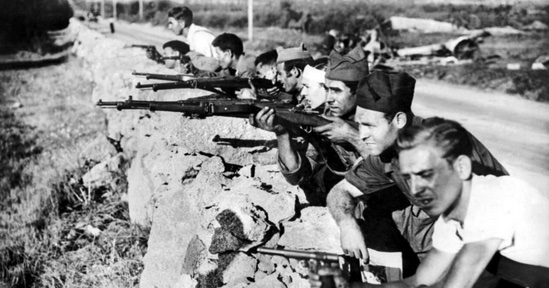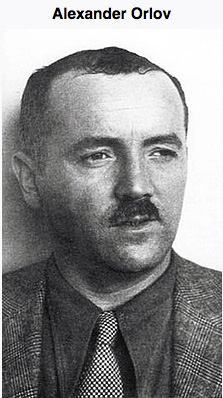
- Articles
Stalin’s Secrets in the Spanish Civil War (1936–1939) by Miguel A. Faria, Jr., MD
Despite the cautious attitude of the Western democracies regarding involvement in the volatile situation in Spain in 1936, more than 35,000 volunteers from 52 countries flocked to Spain to fight in a war that they mistakenly believed would be the epic battle between fascism and freedom.
The majority of the 35,000 foreigners that comprised the International Brigades were socialists and communists, as were most members of the Spanish Loyalist forces. The Brigades were organized by the Communist International, although their allegiance was ostensibly to the Second Spanish Republic and fought for the “Republican” cause. Journalist Dave Roos added, “More than 2,800 Americans, many who were members of the American Communist Party, crossed the Atlantic to volunteer as part of the Abraham Lincoln Brigade.” Additionally, the Loyalist (or Republican) forces contained a large contingent of anarchists from Catalonia and the city of Barcelona. A young Englishman named George Orwell was one of the socialist volunteers who believed the romanticized version of the struggle but discovered that this could not be further from the truth.
Alexander Orlov, General-Major NKVD
The historians Costello and Tsarev relate why an NKVD General-Major named Alexander Orlov was dispatched by Stalin to the Iberian Peninsula:
Stalin had answered the appeals from Madrid that summer, not out of conscience, but to further Soviet ambitions. He grudgingly dispatched arms and military advisers—including Alexander Orlov, now a General-Major—to assist the Spanish government with counterintelligence and guerrilla warfare operations.
Years later, the same Alexander Orlov defected to the West and ostensibly switched allegiance from the USSR to the United States, denouncing Stalin and the crimes committed in the Soviet Union during the 1930s under the auspices of his former boss. Nevertheless, after his defection Orlov remained an elusive figure. His whereabouts were unknown for more than a decade, and despite this obscurity, Orlov was protected by the United States. Whether Orlov was a bona fide defector, a double agent, or an asylum-seeker has been debated in at least two major books.

In Spain, Alexander Orlov headed and conducted numerous missions for Joseph Stalin and the Soviet Union. Two missions are particularly significant and will be discussed in some detail in this chapter. The first mission involved the extermination of Soviet allies—namely, the anarchists and “leftist” Trotskyites—even though the factions were fighting against a common enemy, the Nationalists under General Francisco Franco. Communist brigades of NKVD units working under Stalin’s orders carried out the eliminations. The units were sent to Spain to wipe out former Soviet allies because Stalin no longer trusted them. Moreover, Stalin considered Trotsky and Trotsky’s followers to be his number one enemy and therefore no quarter should be given to them. In fact, the exterminations of former friends and allies by the Soviet NKVD commandos was carried out with more avidity than when they fought the “fascist” forces of Generalissimo Franco.
Pavel Sudoplatov, the Soviet spymaster who held high positions in the state security apparatus, recalled:
From 1936 to 1939 there were two life-and-death struggles in Spain, Both of them civil wars. One pitted nationalist forces, led by Francisco Franco, aided by Hitler, against the Spanish Republicans, aided by communists. The other was a separate war among communists themselves. Stalin in the Soviet Union and Trotsky in exile each hoped to be the savior and the sponsor of the Republicans and thereby became the vanguard for the world communist revolution.
The other mission was carried out towards the end of the Spanish Civil War just before the defeat of the communists and prior to Orlov’s defection. The NKVD general assisted Stalin in virtually robbing Spain of its gold reserves—that is, gold that had accumulated over centuries of Spanish history.
The Astounding Soviet Defection Deception
In Alexander Orlov: The FBI’s KGB General, a former FBI agent Edward Gazur tried to prove the impossible—namely that Alexander Orlov was a true defector, a man who switched allegiances from the Soviet Union to America and repudiated international communism.
Gazur ardently believed that Orlov, who became his friend and who Gazur came to view as a father figure, had genuinely cooperated with the FBI and the CIA. Gazur’s own book, unfortunately, proved quite the opposite.
Moreover, Costello and Tsarev revealed that Orlov had a tacit agreement with Stalin—that is, Orlov would not reveal any intelligence secrets to the West and in turn Stalin’s agents would not hunt him down or harm his family. They wrote:
What Orlov did was to issue a blackmail threat to Stalin: [Orlov] sent a letter to Stalin and to the chief of the NKVD, Yezhov, warning Stalin that if they took revenge on his family or if they succeeded in murdering him, then Orlov had directed his lawyer to publish all the data known to him about Stalin’s crimes, which he enumerated in the two thirty-seven-page blackmail letters.
Years later in testimony before the U.S. Senate on September 28, 1955, Alexander Orlov denounced Stalin, who had annihilated many of his compatriots in the various purges. But that testimony does not make him a genuine defector. Orlov never fully cooperated with U.S. authorities. Sudoplatov explained:
His disappearance was of concern to us because Orlov was also aware of our NKVD network in France and Germany. He even knew of Philby, Maclean, Burgess, and Blunt and the state of their cooperation with us. His defection raised serious doubt whether Philby and his friends had been compromised. Yet in November 1938, Beria summoned me and among other instructions ordered me to stop any efforts to locate Orlov…. The order from Beria was that the Central Committee had decided to leave him alone.
Costello and Tsarev concur:
If Orlov had broken faith with Lenin’s Revolution and had given the secret list of underground Soviet agents to the FBI instead of withholding the information, he might single-handedly have changed the course of history. Had he blown the ‘illegal’ networks in 1938 he would have deprived Stalin of vital information from such agents as [Kim] Philby and the Rote Kapelle [Red Orchestra], which played a part in World War II. If he had exposed these Soviet underground networks, Stalin’s agents might never have stolen the secrets of the atomic bomb.
According to one CIA official, Alexander Orlov always remained the consummate professional. “Orlov never fully unburdened all his secrets…He only revealed what he wanted to reveal.”
Curiously, Gazur wrote his tome after an FBI colleague brought to his attention the book Deadly Illusions, which was based on KGB files opened to scholars at the time. Deadly Illusions presented Orlov in a very different light. Gazur was astonished: “What I read about Orlov and the man I knew personally and called a close friend seemed to be two entirely different people.” Indeed.
The NKVD General-Major had perpetrated one of the most astounding cases of defection deception in U.S. history. Through Gazur’s apologia one does learn how the Soviet general survived in the United States, eluded the FBI and the CIA for 15 years while remaining virtually in hiding, and then managed to provide the FBI, CIA, and the Immigration and Naturalization Service (INS) with enough tidbits of information and circumlocution to enable him to remain in the United States.
Orlov never once betrayed the USSR or any of the Soviet agents who had operated or were still operating against the U.S. and the West. More apropos, Orlov did not expose the British traitor Kim Philby or any others in the Cambridge spy ring, the Cambridge Five, who did so much harm to America and the West. Neither did Orlov expose specific Soviet operations undermining the security of the United States. Orlov did not even reveal to Gazur that he had traveled to England on a false American passport and had been the head of the London rezidentura from summer 1934 to fall 1935—not to mention that he had headed for a time the recruitment of the notorious spy ring and handled the British agents himself.
Stalin’s Plunder of Spain’s Gold Reserves
Alexander Orlov served Stalin for more than a decade before he allegedly defected. He not only exterminated the Trotskyites and anarchists in Spain but also masterfully plundered the Spanish treasury towards the end of the war. Three-fourths of Spain’s gold reserves were moved to the USSR on Stalin’s order and with the consent of the Spanish communist leaders in the Republican (Loyalist) government, which wanted the Soviets to “safeguard” the Spanish gold since Franco’s Nationalist army was rapidly advancing towards Madrid. Approximately 7,900 boxes, each containing 145 pounds of gold cast ingots and gold coins, a fabulous national wealth accumulated through the centuries and extending all the way back to Spain’s Siglo de Oro, were “transferred” by the communist leaders of “Republican” Spain to the USSR for “safe keeping.”
Needless to say, the Soviet Union (and now Russia) never returned the gold. As Stalin told Nikolai Yezhov, “They will never see their gold again, just as they do not see their own ears.”[15] To their everlasting shame and for their unforgivable betrayal of their country—not to mention incredible stupidity—the Spanish communist leaders the ostensible “Republican” in the “Loyalist” government had betrayed their country for the poisoned rivers of blood of communism!
Written by Dr. Miguel A. Faria
This article is excerpted and updated from Dr. Miguel A. Faria’s book; Stalin, Mao, Communism, and the 21st Century Aftermath in Russia and China (2024).
Miguel A. Faria, M.D., is Associate Editor in Chief in neuropsychiatry; and socioeconomics, politics, and world affairs of Surgical Neurology International (SNI). He is the author of numerous books, the most recent—America, Guns, and Freedom (2019); Controversies in Medicine and Neuroscience: Through the Prism of History, Neurobiology, and Bioethics (2023); Cuba’s Eternal Revolution through the Prism of Insurgency, Socialism, and espionage (2023); Stalin, Mao, Communism, and the 21st Century Aftermath in Russia and China (2024); and Contrasting Ideals and Ends in the American and French Revolutions (in press)—the last four books by Cambridge Scholars Publishing, Newcastle upon Tyne, U.K.
This article may be cited as: Faria MA. Stalin’s Secrets in the Spanish Civil War (1936–1939). HaciendaPublishing.com, December 2, 2024. Available from: https://haciendapublishing.com/stalins-secrets-in-the-spanish-civil-war-19361939-by-miguel-a-faria-jr-md/.
Copyright ©2024 HaciendaPublishing.com